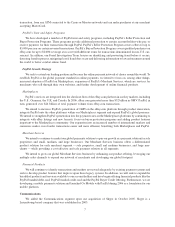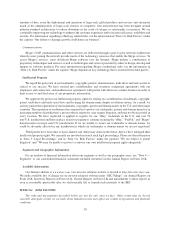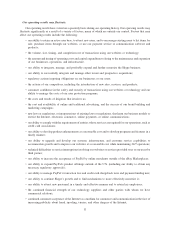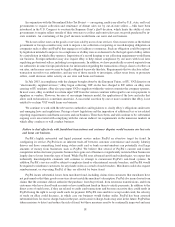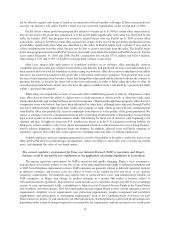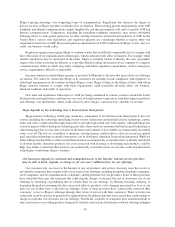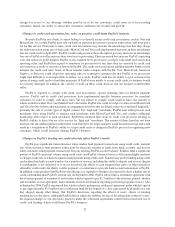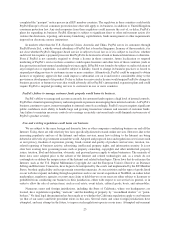eBay 2006 Annual Report Download - page 21
Download and view the complete annual report
Please find page 21 of the 2006 eBay annual report below. You can navigate through the pages in the report by either clicking on the pages listed below, or by using the keyword search tool below to find specific information within the annual report.has suffered intermittent unavailability for periods as long as five days. Any unscheduled interruption in our
services results in an immediate, and possibly substantial, loss of revenues. Frequent or persistent interruptions in
our services could cause current or potential users to believe that our systems are unreliable, leading them to switch
to our competitors or to avoid our sites, and could permanently harm our reputation and brands. Reliability is
particularly critical for PayPal, especially as it seeks to expand its Merchant Services business. Because PayPal is a
regulated financial entity, frequent or persistent site interruptions could lead to regulatory inquiries. These inquiries
could result in fines, penalties, or mandatory changes to PayPal’s business practices, and ultimately could cause
PayPal to lose existing licenses it needs to operate or prevent it from obtaining additional licenses that it needs to
expand. Finally, because our customers may use our products for critical transactions, any system failures could
result in damage to our customers’ businesses. These customers could seek significant compensation from us for
their losses. Even if unsuccessful, this type of claim likely would be time consuming and costly for us to address.
Although our systems have been designed around industry-standard architectures to reduce downtime in the
event of outages or catastrophic occurrences, they remain vulnerable to damage or interruption from earthquakes,
floods, fires, power loss, telecommunication failures, terrorist attacks, computer viruses, computer denial-of-ser-
vice attacks, and similar events. Some of our systems, including our Shopping.com and Skype websites, are not
fully redundant, and our disaster recovery planning is not sufficient for all eventualities. Our systems are also
subject to break-ins, sabotage, and intentional acts of vandalism. Despite any precautions we may take, the
occurrence of a natural disaster, a decision by any of our third-party hosting providers to close a facility we use
without adequate notice for financial or other reasons, or other unanticipated problems at our hosting facilities could
result in lengthy interruptions in our services. We do not carry business interruption insurance sufficient to
compensate us for losses that may result from interruptions in our service as a result of system failures.
Our growth will depend on our ability to develop our brands, and these efforts may be costly.
Our historical growth has been largely attributable to word of mouth, and to frequent and high visibility
national and local media coverage. We believe that continuing to strengthen our brands will be critical to achieving
widespread acceptance of our services, and will require an increased focus on active marketing efforts across all of
our brands. The demand for and cost of online and traditional advertising have been increasing, and may continue to
increase. Accordingly, we will need to spend increasing amounts of money on, and devote greater resources to,
advertising, marketing, and other efforts to create and maintain brand loyalty among users. During 2004 and 2005,
we significantly increased the number of brands we are supporting, adding Rent.com, Shopping.com, Kijiji, and
Skype, among others. Each of these brands requires its own resources, increasing the costs of our branding efforts.
Brand promotion activities may not yield increased revenues, and even if they do, any increased revenues may not
offset the expenses incurred in building our brands. If we do attract new users to our services, they may not conduct
transactions using our services on a regular basis. If we fail to promote and maintain our brands, or if we incur
substantial expenses in an unsuccessful attempt to promote and maintain our brands, our business would be harmed.
Our business and users may be subject to sales tax and other taxes.
The application of indirect taxes (such as sales and use tax, value-added tax, or VAT, goods and services tax,
business tax, and gross receipt tax) to e-commerce businesses such as eBay and to our users is a complex and
evolving issue. Many of the fundamental statutes and regulations that impose these taxes were established before
the growth of the Internet and e-commerce. In many cases, it is not clear how existing statutes apply to the Internet
or electronic commerce or communications conducted over the Internet. In addition, some jurisdictions have
implemented or may implement laws specifically addressing the Internet or some aspect of electronic commerce or
communications on the Internet. The application of existing, new, or future laws could have adverse effects on our
business.
Several proposals have been made at the U.S. state and local level that would impose additional taxes on the
sale of goods and services through the Internet. These proposals, if adopted, could substantially impair the growth of
e-commerce, and could diminish our opportunity to derive financial benefit from our activities. The U.S. federal
government’s moratorium on states and other local authorities imposing access or discriminatory taxes on the
Internet is scheduled to expire in November 2007. This moratorium does not prohibit federal, state, or local
authorities from collecting taxes on our income or from collecting taxes that are due under existing tax rules.
17


